Aofei Chang
Enhancing Medical Large Vision-Language Models via Alignment Distillation
Dec 21, 2025
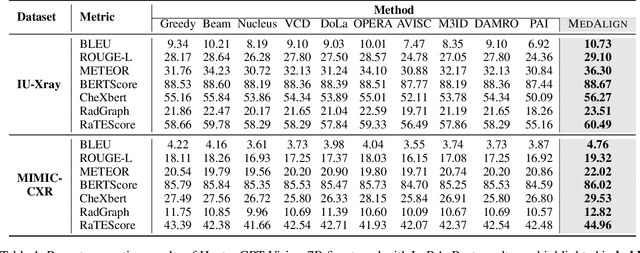

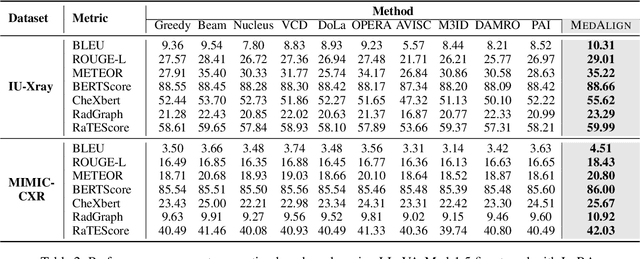
Abstract:Medical Large Vision-Language Models (Med-LVLMs) have shown promising results in clinical applications, but often suffer from hallucinated outputs due to misaligned visual understanding. In this work, we identify two fundamental limitations contributing to this issue: insufficient visual representation learning and poor visual attention alignment. To address these problems, we propose MEDALIGN, a simple, lightweight alignment distillation framework that transfers visual alignment knowledge from a domain-specific Contrastive Language-Image Pre-training (CLIP) model to Med-LVLMs. MEDALIGN introduces two distillation losses: a spatial-aware visual alignment loss based on visual token-level similarity structures, and an attention-aware distillation loss that guides attention toward diagnostically relevant regions. Extensive experiments on medical report generation and medical visual question answering (VQA) benchmarks show that MEDALIGN consistently improves both performance and interpretability, yielding more visually grounded outputs.
Focus on What Matters: Enhancing Medical Vision-Language Models with Automatic Attention Alignment Tuning
May 24, 2025Abstract:Medical Large Vision-Language Models (Med-LVLMs) often exhibit suboptimal attention distribution on visual inputs, leading to hallucinated or inaccurate outputs. Existing mitigation methods primarily rely on inference-time interventions, which are limited in attention adaptation or require additional supervision. To address this, we propose A$^3$Tune, a novel fine-tuning framework for Automatic Attention Alignment Tuning. A$^3$Tune leverages zero-shot weak labels from SAM, refines them into prompt-aware labels using BioMedCLIP, and then selectively modifies visually-critical attention heads to improve alignment while minimizing interference. Additionally, we introduce a A$^3$MoE module, enabling adaptive parameter selection for attention tuning across diverse prompts and images. Extensive experiments on medical VQA and report generation benchmarks show that A$^3$Tune outperforms state-of-the-art baselines, achieving enhanced attention distributions and performance in Med-LVLMs.
MedHEval: Benchmarking Hallucinations and Mitigation Strategies in Medical Large Vision-Language Models
Mar 04, 2025
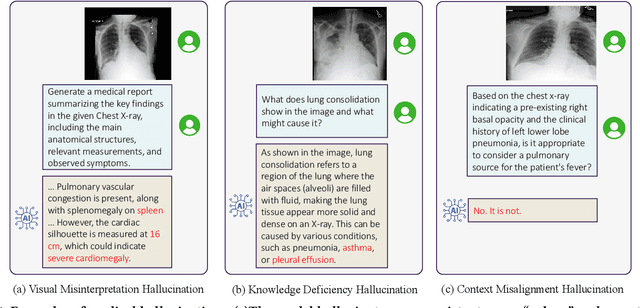


Abstract:Large Vision Language Models (LVLMs) are becoming increasingly important in the medical domain, yet Medical LVLMs (Med-LVLMs) frequently generate hallucinations due to limited expertise and the complexity of medical applications. Existing benchmarks fail to effectively evaluate hallucinations based on their underlying causes and lack assessments of mitigation strategies. To address this gap, we introduce MedHEval, a novel benchmark that systematically evaluates hallucinations and mitigation strategies in Med-LVLMs by categorizing them into three underlying causes: visual misinterpretation, knowledge deficiency, and context misalignment. We construct a diverse set of close- and open-ended medical VQA datasets with comprehensive evaluation metrics to assess these hallucination types. We conduct extensive experiments across 11 popular (Med)-LVLMs and evaluate 7 state-of-the-art hallucination mitigation techniques. Results reveal that Med-LVLMs struggle with hallucinations arising from different causes while existing mitigation methods show limited effectiveness, especially for knowledge- and context-based errors. These findings underscore the need for improved alignment training and specialized mitigation strategies to enhance Med-LVLMs' reliability. MedHEval establishes a standardized framework for evaluating and mitigating medical hallucinations, guiding the development of more trustworthy Med-LVLMs.
BIPEFT: Budget-Guided Iterative Search for Parameter Efficient Fine-Tuning of Large Pretrained Language Models
Oct 04, 2024



Abstract:Parameter Efficient Fine-Tuning (PEFT) offers an efficient solution for fine-tuning large pretrained language models for downstream tasks. However, most PEFT strategies are manually designed, often resulting in suboptimal performance. Recent automatic PEFT approaches aim to address this but face challenges such as search space entanglement, inefficiency, and lack of integration between parameter budgets and search processes. To overcome these issues, we introduce a novel Budget-guided Iterative search strategy for automatic PEFT (BIPEFT), significantly enhancing search efficiency. BIPEFT employs a new iterative search strategy to disentangle the binary module and rank dimension search spaces. Additionally, we design early selection strategies based on parameter budgets, accelerating the learning process by gradually removing unimportant modules and fixing rank dimensions. Extensive experiments on public benchmarks demonstrate the superior performance of BIPEFT in achieving efficient and effective PEFT for downstream tasks with a low parameter budget.
CoRelation: Boosting Automatic ICD Coding Through Contextualized Code Relation Learning
Feb 24, 2024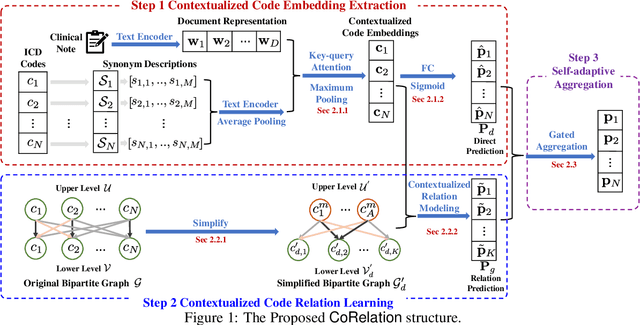

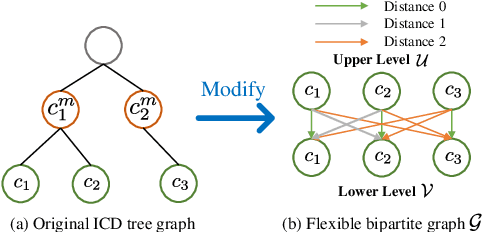
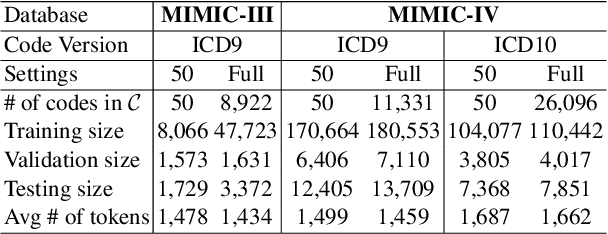
Abstract:Automatic International Classification of Diseases (ICD) coding plays a crucial role in the extraction of relevant information from clinical notes for proper recording and billing. One of the most important directions for boosting the performance of automatic ICD coding is modeling ICD code relations. However, current methods insufficiently model the intricate relationships among ICD codes and often overlook the importance of context in clinical notes. In this paper, we propose a novel approach, a contextualized and flexible framework, to enhance the learning of ICD code representations. Our approach, unlike existing methods, employs a dependent learning paradigm that considers the context of clinical notes in modeling all possible code relations. We evaluate our approach on six public ICD coding datasets and the experimental results demonstrate the effectiveness of our approach compared to state-of-the-art baselines.
Recent Advances in Predictive Modeling with Electronic Health Records
Feb 02, 2024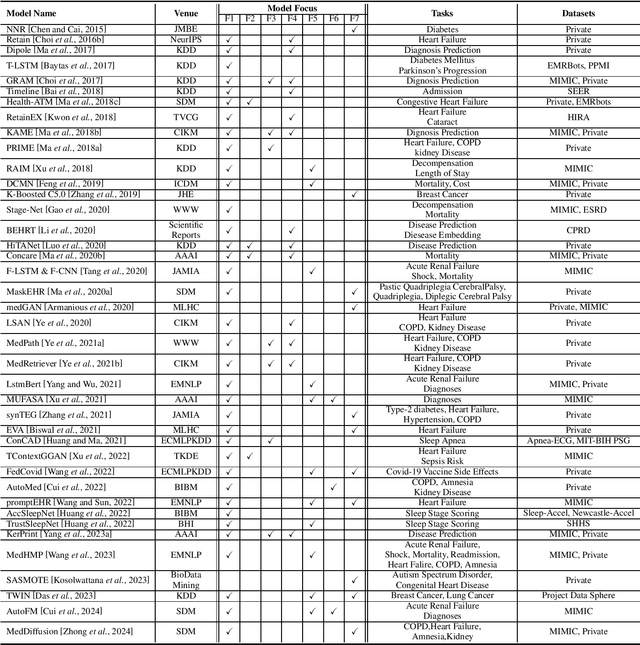
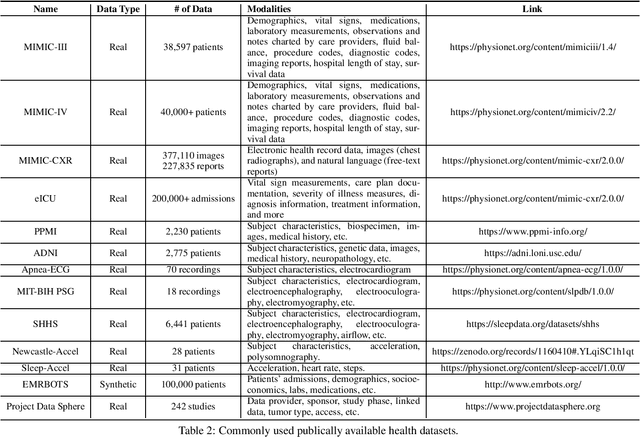
Abstract:The development of electronic health records (EHR) systems has enabled the collection of a vast amount of digitized patient data. However, utilizing EHR data for predictive modeling presents several challenges due to its unique characteristics. With the advancements in machine learning techniques, deep learning has demonstrated its superiority in various applications, including healthcare. This survey systematically reviews recent advances in deep learning-based predictive models using EHR data. Specifically, we begin by introducing the background of EHR data and providing a mathematical definition of the predictive modeling task. We then categorize and summarize predictive deep models from multiple perspectives. Furthermore, we present benchmarks and toolkits relevant to predictive modeling in healthcare. Finally, we conclude this survey by discussing open challenges and suggesting promising directions for future research.
 Add to Chrome
Add to Chrome Add to Firefox
Add to Firefox Add to Edge
Add to Edge